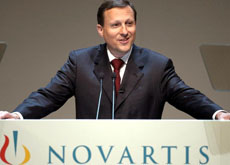Novartis reports healthy growth

The Swiss pharmaceuticals giant, Novartis, has once again reported record earnings, with a jump of 6.2 per cent in net profit to over $5 billion (SFr6.18 billion) in 2003.
The Basel-based group said it expected to achieve strong earnings in 2004 while continuing investment in new medicines.
The results were slightly above analysts’ expectations.
The world’s fifth-largest pharmaceutical group said in a statement that the result was driven by a 19 per cent rise in annual sales to $24.9 billion.
“[Our sales have] reached record levels for the eighth time in our eight-year history,” said Daniel Vasella, Novartis chairman and CEO.
“In pharmaceuticals, we moved up to the number five rank worldwide. In research and development, we increased our investment by 32 per cent.”
Vasella told swissinfo he was a “happy man”.
“I would point to the market share gains first – that is certainly something that makes me feel relatively good,” he said.
“Obviously we have invested a ton of money in research and development,” Vasella continued.
“We made a concession there, letting profitability go down a little bit in 2003-4 in order to sustain the innovation rate.”
Drugs sales
Sales at Novartis’s flagship drugs division advanced 18 per cent to $16 billion.
Growth in the generic drugs section was “especially strong”, according to Patrick Burgermeister, a senior financial analyst with Zurich Cantonal Bank.
Burgermeister explained that the growth in generics was partly driven by the acquisition in 2003 of Lek, a Slovenian company, and because many patents of popular drugs had expired in the United States in 2003.
“Over the past few years, Novartis is the company which has had the most new drugs approved in the US,” he told swissinfo.
Sales of core drugs, such as hypertension agents Diovan and Lotrel, and cancer drugs Glivec and Zometa, continued to grow and are due to be backed up by new launches in 2004 of drugs for transplant patients and overactive bladders.
Roche stake
Last year, Novartis also increased its voting stake in its rival, Roche, to 33.3 per cent from 32.7 per cent. But it said it did not plan to buy more shares as doing so would force it to launch a formal bid for Roche.
“It’s an irrelevant change,” Vasella told swissinfo. “We wanted to go to the limit which we’re allowed to go to by law, so we are now at the maximum.”
It is the second year in a row that Novartis has upped its voting stake in Roche. In January last year it announced it had increased its share from 21.3 per cent to 32.7 per cent.
Roche, which is majority controlled by the founder’s heirs, has continuously rebuffed Novartis’s suggestion of a merger, which would create a pharmaceutical behemoth.
Shares buyback
On Thursday, Novartis also announced it would ask shareholders to approve a programme to repurchase up to $2.41 billion worth of its stock.
“The board will propose reducing Novartis’s share capital by the amounts repurchased each year, starting in 2005,” the company said it a statement.
Burgermeister said the buyback was an unwritten policy at Novartis.
“They always invest about half of their free cash flow in share buyback,” he said. “Had they stopped this policy this year, the market would have reacted negatively.”
swissinfo, Vanessa Mock and Robert Brookes
Novartis posted a net profit of $5.02 billion in 2003 on sales of $16.02 billion.
Fourth-quarter net profits were $1.36 billion on group sales of $6.73 billion and drug sales of $4.38 billion.
The company was created in 1996 by the merger of the two Basel companies Ciba and Sandoz.
Daniel Vasella was appointed chief executive of Novartis in 1996. He became chairman of the board in 1999.

In compliance with the JTI standards
More: SWI swissinfo.ch certified by the Journalism Trust Initiative










You can find an overview of ongoing debates with our journalists here . Please join us!
If you want to start a conversation about a topic raised in this article or want to report factual errors, email us at english@swissinfo.ch.